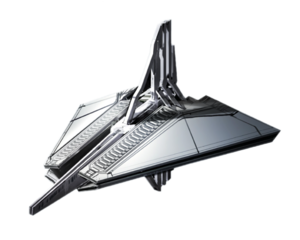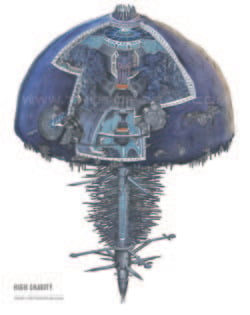Fortress-class vessel: Difference between revisions
From Halopedia, the Halo wiki
Hyperx1000 (talk | contribs) No edit summary |
mNo edit summary |
||
| (24 intermediate revisions by 10 users not shown) | |||
| Line 1: | Line 1: | ||
{{Title|''Fortress''-class vessel}} | {{Title|''Fortress''-class vessel}} | ||
{{ | {{Status|Canon}} | ||
{{ | {{disambig header|a starship class|other articles named "Fortress"|Fortress}} | ||
{{Ship | {{Ship class infobox | ||
|name= ''Fortress''-class vessel | |name= ''Fortress''-class vessel | ||
|image= | |image=[[File:Enc22 FortressClass.png|300px]]<br>An example of a ''Fortress''-class vessel | ||
|manufacturer= Forerunner ecumene | |manufacturer= Forerunner ecumene | ||
|class= | |class= | ||
|role=[[Carrier]] | |role=[[Carrier]] | ||
|length= | |length=Varies | ||
|width= | |width=Varies | ||
|height= | |height= | ||
|engine= | |engine= | ||
|slipspace drive= Equipped | |slipspace drive= Equipped | ||
|hull= | |hull= | ||
|armament= | |armament= | ||
|complement=*[[Harrier-class vessel|Attack harriers]] | *[[Heavy ion weapon system]] {{C|On larger examples}}{{Ref/Reuse|Ion}} | ||
*Phalanxes of [[weapon-ship]]s | *Tail-mounted [[directed-energy weapon]]ry{{Ref/Reuse|HC20}} | ||
*Hundreds of thousands of [[Warrior-Servants|warriors]] | |complement=*[[Harrier-class vessel|Attack harriers]]{{Ref/Novel|Sil|Chapter=String 25, Fragment 1}} | ||
*Phalanxes of [[weapon-ship]]s{{Ref/Reuse|HC20}} | |||
*Hundreds of thousands of [[Warrior-Servants|warriors]]{{Ref/Reuse|HC20}} | |||
|era= *[[Human-Forerunner War]] | |era= *[[Human-Forerunner War]] | ||
*[[Forerunner-Flood War]] | *[[Forerunner-Flood War]] | ||
|affiliation= [[Forerunner | |affiliation=*[[Forerunner]] [[Ecumene]] | ||
*[[Created]]{{Ref/Novel|Id=Out23|Out|Chapter=23}} | |||
}} | }} | ||
'''''Fortress''-class | '''''Fortress''-class vessels''', more commonly known as '''fortresses''' or '''fortress ships''', were massive warships used by the [[Forerunner]] military. The ''Fortress''{{'}} name is in reference to the ship's size and power.{{Ref/Book|Enc22|Page=360}} | ||
==Design details== | ==Overview== | ||
''Fortress''-class | ===Design details=== | ||
While not all of a single unified design, ''Fortress''-class vessels were known to be some of the largest and most powerful vessels in the [[Forerunner fleet|Forerunner navy]]. From bow to stern, some many of these ships were approximately 50 kilometers long and 10 kilometers across at the widest point. The hull was generally divided into three sections and the foremost section of the ship sometimes featured a massive hemispherical structure that was 10 kilometers in diameter. The dome's hollow core served as living space for hundreds of thousands of Forerunner [[Warrior-Servant]]s. Below the dome was a mid-section composed of layered platforms supporting landing bays and weapon mounts. The aft section of the ship was a long "tail" covered in gun emplacements and other forms of energy weaponry.{{Ref/Novel|Id=HC20|Cry|Chapter=20}} | |||
As previously noted, ''Fortress'' ships did not follow a single design and could be encountered in different shapes and sizes; ships used toward the end of the [[Forerunner-Flood war]] measured up to 100 km in length with far more destructive capabilities.{{Ref/Novel|Id=HC27|Cry|Chapter=27}} Extremely large examples of ''Fortress''es (presumably such as the aforementioned hundred-kilometre example) may be fitted with [[heavy ion weapon system]]s as their primary superweapons.{{Ref/Book|Id=Ion|Enc22|Page=377}} ''Fortress''-class ships may also incorporate [[Minoris Assembler Vats]] into their structure to allow for the mass on-site fabrication of lower-tier constructs such as [[Sentinel]]s.{{Ref/Book|Enc22|Page=325}} | |||
===Complement=== | |||
Due to their behemoth structure, a single fortress ship was capable of carrying and deploying enormous amounts of [[Harrier-class vessel|harriers]] and [[weapon-ship]]s. During battle, fortresses would first deploy thousands of swift attack craft in outward-fanning formations.{{Ref/Reuse|HC20}} They also had automated screens of weapon-ships, up to a million of which could be commanded by individual Warriors.{{Ref/Reuse|HC20}} | |||
== | ==Ships of the line== | ||
*''[[Deep Reverence]]'' | *''[[Deep Reverence]]'' | ||
*''[[Long Reverence]]'' | |||
== | ==Operational history== | ||
===Forerunner-Flood War=== | |||
During the [[Battle of the Capital]], a battle group of fortresses and [[Forerunner cruiser|cruisers]] attacked the original [[Halo Array|Halo installations]] under [[Mendicant Bias]]'s control.{{Ref/Reuse|HC27}} Later, in one of the final battles of the war, the [[Falchion]]'s interstellar defensive clench comprised twelve fortresses—only partially mobile due to [[reconciliation|space-time debt]]—for a fleet of 700,000 [[Harrier-class vessel|harriers]].{{Ref/Novel|Sil|Chapter=String 25, Fragment 5}} | |||
===Covenant=== | |||
[[File:HWF_HighCharity_CrossSection.jpg|thumb|250px|A cross-section of High Charity, showcasing the Forerunner metal hemispherical dome of the Tuluk'katho Fortress ship buried deep within the station's vast layers.]] | |||
During the early years of the [[Covenant]] empire, prior to around [[648 BCE|648]]-[[791 BCE]], a derelict ''Fortress''-class vessel was discovered in orbit around [[Tuluk'katho]]. The ship's nigh-unbreakable superstructure was used as the basis for the [[Spine of the Gods]], the large "tail" extending through the bottom of the Covenant's capital-station [[High Charity]]. The site of this discovery became the site of High Charity's construction.{{Ref/Book|Enc22|Page=226}} | |||
===Created uprising=== | |||
By [[2559]], the [[Created]] managed to take control of at least one ''Fortress''-class vessel, the ''[[Long Reverence]]'', under the command of the artificial intelligence [[Kathara]].{{Ref/Reuse|Out23}} | |||
==List of appearances== | ==List of appearances== | ||
| Line 41: | Line 55: | ||
*''[[Halo: Primordium]]'' {{Mo}} | *''[[Halo: Primordium]]'' {{Mo}} | ||
*''[[Halo: Silentium]]'' | *''[[Halo: Silentium]]'' | ||
*''[[Halo: Outcasts]]'' {{Mo}} | |||
*''[[Halo: Epitaph]]'' | |||
==Sources== | ==Sources== | ||
{{Ref/Sources}} | |||
{{Forerunner|ships}} | {{Forerunner|ships}} | ||
Latest revision as of 23:24, November 18, 2024
| Fortress-class vessel | |
|---|---|
 An example of a Fortress-class vessel | |
| Production information | |
|
Manufacturer: |
Forerunner ecumene |
|
Role: |
|
| Technical specifications | |
|
Length: |
Varies |
|
Width: |
Varies |
|
Slipspace drive: |
Equipped |
|
Armament: |
|
|
Complement: |
|
| Chronological and affiliation | |
|
Era: |
|
|
Affiliation: |
|
Fortress-class vessels, more commonly known as fortresses or fortress ships, were massive warships used by the Forerunner military. The Fortress' name is in reference to the ship's size and power.[5]
Overview[edit]
Design details[edit]
While not all of a single unified design, Fortress-class vessels were known to be some of the largest and most powerful vessels in the Forerunner navy. From bow to stern, some many of these ships were approximately 50 kilometers long and 10 kilometers across at the widest point. The hull was generally divided into three sections and the foremost section of the ship sometimes featured a massive hemispherical structure that was 10 kilometers in diameter. The dome's hollow core served as living space for hundreds of thousands of Forerunner Warrior-Servants. Below the dome was a mid-section composed of layered platforms supporting landing bays and weapon mounts. The aft section of the ship was a long "tail" covered in gun emplacements and other forms of energy weaponry.[2]
As previously noted, Fortress ships did not follow a single design and could be encountered in different shapes and sizes; ships used toward the end of the Forerunner-Flood war measured up to 100 km in length with far more destructive capabilities.[6] Extremely large examples of Fortresses (presumably such as the aforementioned hundred-kilometre example) may be fitted with heavy ion weapon systems as their primary superweapons.[1] Fortress-class ships may also incorporate Minoris Assembler Vats into their structure to allow for the mass on-site fabrication of lower-tier constructs such as Sentinels.[7]
Complement[edit]
Due to their behemoth structure, a single fortress ship was capable of carrying and deploying enormous amounts of harriers and weapon-ships. During battle, fortresses would first deploy thousands of swift attack craft in outward-fanning formations.[2] They also had automated screens of weapon-ships, up to a million of which could be commanded by individual Warriors.[2]
Ships of the line[edit]
Operational history[edit]
Forerunner-Flood War[edit]
During the Battle of the Capital, a battle group of fortresses and cruisers attacked the original Halo installations under Mendicant Bias's control.[6] Later, in one of the final battles of the war, the Falchion's interstellar defensive clench comprised twelve fortresses—only partially mobile due to space-time debt—for a fleet of 700,000 harriers.[8]
Covenant[edit]
During the early years of the Covenant empire, prior to around 648-791 BCE, a derelict Fortress-class vessel was discovered in orbit around Tuluk'katho. The ship's nigh-unbreakable superstructure was used as the basis for the Spine of the Gods, the large "tail" extending through the bottom of the Covenant's capital-station High Charity. The site of this discovery became the site of High Charity's construction.[9]
Created uprising[edit]
By 2559, the Created managed to take control of at least one Fortress-class vessel, the Long Reverence, under the command of the artificial intelligence Kathara.[4]
List of appearances[edit]
- Halo: Cryptum (First appearance)
- Halo: Primordium (Mentioned only)
- Halo: Silentium
- Halo: Outcasts (Mentioned only)
- Halo: Epitaph
Sources[edit]
- ^ a b Halo Encyclopedia (2022 edition), page 377
- ^ a b c d e f Halo: Cryptum, chapter 20
- ^ Halo: Silentium, String 25, Fragment 1
- ^ a b Halo: Outcasts, chapter 23
- ^ Halo Encyclopedia (2022 edition), page 360
- ^ a b Halo: Cryptum, chapter 27
- ^ Halo Encyclopedia (2022 edition), page 325
- ^ Halo: Silentium, String 25, Fragment 5
- ^ Halo Encyclopedia (2022 edition), page 226
| |||||||||||||||||||||||||||||
